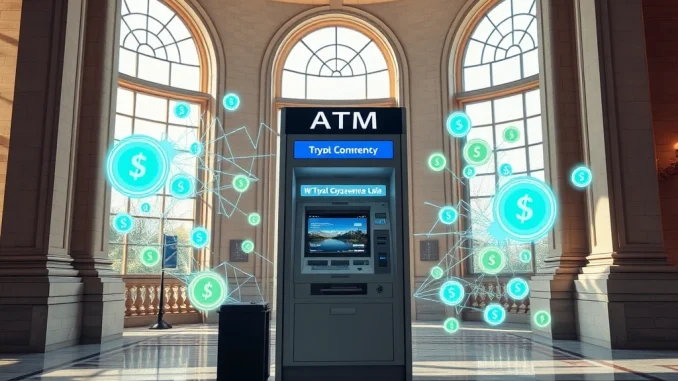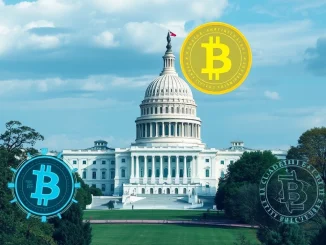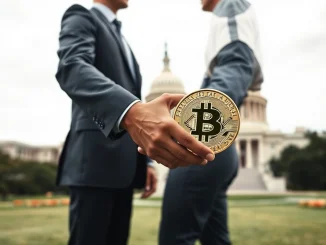
Imagine walking into a familiar government building – perhaps a post office or a courthouse – and seeing a machine where you can easily buy or sell Bitcoin. That’s the bold vision recently put forward by a US Congressman, sparking discussion across the cryptocurrency landscape.
The Proposal: Bringing Crypto ATMs to Federal Buildings
Texas Representative Lance Gooden has formally urged the General Services Administration (GSA), the agency that manages federal buildings and property, to consider installing Crypto ATMs within these public spaces. This isn’t just a casual suggestion; it’s a move aimed at integrating digital assets into more accessible public infrastructure.
The proposal aligns with what Gooden describes as a pro-crypto stance, reportedly referencing sentiments from figures like former President Trump, who has expressed openness to cryptocurrencies.
At its core, a Crypto ATM functions much like a traditional ATM, but instead of dispensing fiat currency from a bank account, it allows users to exchange cash for cryptocurrency (like Bitcoin or Ethereum) or sometimes sell crypto for cash. Bringing these machines into federal buildings would represent a significant step in making cryptocurrency transactions physically present in government-managed locations.
Why This US Congressman Sees Opportunity
Representative Gooden highlights several potential benefits he believes would come from placing Crypto ATMs in federal buildings:
- Innovation: Positioning the government as open to technological advancement and digital finance.
- Identity Verification: Gooden suggests these ATMs could incorporate robust identity verification processes, potentially enhancing security and compliance compared to less regulated platforms.
- Transaction Transparency: Proponents argue that regulated ATM transactions can offer a clear, verifiable record, contributing to transparency in cryptocurrency activity.
This perspective frames the move not just as a convenience for crypto users, but as a way to potentially leverage aspects of crypto technology within a controlled, government-adjacent environment. It’s a fascinating angle on how a US Congressman views the intersection of public services and emerging digital assets.
Navigating the Hurdles: Cryptocurrency Regulation and Concerns
While the proposal emphasizes innovation and transparency, it lands squarely in the ongoing debate surrounding cryptocurrency regulation in the United States. As reported by CoinDesk and other outlets, the suggestion comes amid existing concerns about crypto ATM-related fraud and their potential use in illicit activities.
Installing these machines in sensitive locations like federal buildings would undoubtedly raise questions about security, oversight, and compliance with Know Your Customer (KYC) and Anti-Money Laundering (AML) laws. Who would operate these machines? How would their security be ensured within government property? These are just some of the questions that would need rigorous answers.
The current landscape of cryptocurrency regulation in the U.S. is complex, involving multiple agencies like the SEC, CFTC, FinCEN, and state-level regulators. Any move to place transactional crypto infrastructure within federal property would require careful consideration of these existing rules and potentially necessitate new guidelines.
The Broader Context: Government Crypto and Digital Assets
This proposal by a US Congressman isn’t happening in a vacuum. Governments globally are grappling with how to interact with digital assets. From exploring Central Bank Digital Currencies (CBDCs) to developing tax frameworks and enforcement strategies, the relationship between government and crypto is evolving rapidly.
Placing Crypto ATMs in federal buildings could be seen by some as a step towards acknowledging crypto’s growing presence, while others might view it as introducing unnecessary risk into public spaces. It highlights the tension between fostering financial innovation and ensuring public safety and financial security under established cryptocurrency regulation.
Potential Impacts to Consider:
- Public Accessibility: Could make buying/selling crypto easier for individuals who prefer physical locations over online exchanges.
- Security Risks: Potential for physical security threats to the machines or users, as well as digital security concerns.
- Regulatory Clarity: Might force clearer regulatory stances on physical crypto kiosks.
- Symbolic Value: Could signal government openness or, conversely, spark debate about appropriateness.
This move, if seriously considered by the GSA, would open a new front in the ongoing discussion about government crypto strategies and the future integration of digital assets into everyday life.
Conclusion: A Bold Idea Facing Regulatory Reality
Representative Gooden’s proposal to install Crypto ATMs in federal buildings is undoubtedly a bold idea aimed at promoting innovation and accessibility. By emphasizing identity verification and transparency, the US Congressman attempts to address some inherent concerns about cryptocurrency transactions.
However, the path forward is complex, marked by significant challenges related to existing cryptocurrency regulation and the need to ensure security and prevent fraud within government property. As the conversation around government crypto continues to evolve, proposals like this will test the waters of public acceptance and regulatory feasibility.
Whether this specific proposal gains traction remains to be seen, but it serves as a clear indicator that discussions about integrating digital assets into public infrastructure are actively happening at high levels.



